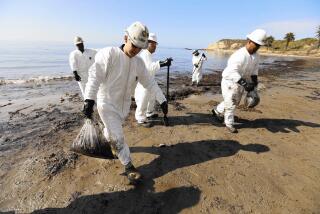Keystone XL pipeline construction begins amid protests
- Share via
The Canadian pipeline company TransCanada has quietly begun construction of the southern leg of the controversial Keystone XL pipeline, installing segments near Livingston, Texas, company officials confirmed Thursday.
“Construction started on Aug. 9. So we’ve now started construction in Texas,” TransCanada spokesman Shawn Howard told the Los Angeles Times.
The southern section of the pipeline received government approval in July.
The first in a series of protests also was launched Thursday as opponents of the pipeline, designed to eventually carry diluted bitumen from the tar sands of northern Canada to refineries on the Texas Gulf Coast, unfurled protest banners at two equipment staging yards in Texas and Oklahoma.
“We just wanted to demonstrate that although they might be ready to begin, we would be ready to meet them,” Ron Seifert, spokesman for Tar Sands Blockade, said in an interview.
He said citizens are prepared to stage sit-ins and other civil disobedience actions to halt the effort of “an international bully” to begin building a pipeline that has spurred widespread protests across the U.S.
TransCanada hopes to construct a pipeline from the Canadian border to Texas. But President Obama in January rejected the company’s application for an international permit to build the entire structure, saying it needed further study -- particularly of any route through the sensitive Sandhills of Nebraska, which lie atop a massive agricultural aquifer.
TransCanada has agreed to reroute the northern portion of the pipeline in Nebraska and has launched a new application. In the meantime, the company, with Obama’s endorsement, has moved to begin construction of the southern half, from Oklahoma to Texas. This portion does not require an international permit.
That construction was imminent became clear in late July, when the U.S. Army Corps of Engineers approved the last of three key permits needed to build the southern section.
“TransCanada is now poised to put approximately 4,000 Americans to work constructing the $2.3 billion pipeline that will be built in three distinct ‘spreads,’ or sections,” Trans Canada Chief Executive Russ Girling said in a statement after the Army Corps permit approval.
Even without the northern section, company officials have said putting the southern section in place will help alleviate a bottleneck of crude oil at the giant terminal in Cushing, Okla., that has helped depress prices for crude oil generated in North America.
Howard said construction is expected to unfold over at least the next year, and probably longer.
“Originally, we had expected it would take a couple of years to build the entire pipeline. This, depending on the seasons and what we’re able to do, we’ll be able to do in less time,” he said.
If the U.S. State Department approves the revised permit application for the northern segment, that construction could begin in early 2013, company officials said.
Pipeline opponents, who say the tar sands bitumen is an especially toxic form of oil that poses a hazard to farms, ranches and residential drinking water across the U.S. heartland, are regrouping to fight the revised international permit and to try to slow construction on the southern route, where some landowners still are fighting TransCanada’s attempts to gain access to their property.
Protesters unfurled banners Thursday at two equipment staging areas, one in Lamar County, Texas, and one in Cushing, Okla., though TransCanada officials said neither was an active construction site.
Siefert said opponents plan to use a variety of tactics, beginning with simple actions in which protesters sit in the path of construction equipment and link arms.
“Every day we can meet construction with direct action is a small victory for us,” he said. “It gives us a chance to describe the harms and abuses and the dangers of this pipeline going forward.”
ALSO:
Elvis candlelight vigil surprise: Priscilla and Lisa Marie
N.Y. support for ‘stop-and-frisk’ split along racial lines in poll
Two Louisiana sheriff’s deputies killed in early morning shootout
More to Read
Sign up for Essential California
The most important California stories and recommendations in your inbox every morning.
You may occasionally receive promotional content from the Los Angeles Times.









